
Co-blogged by American Turban and Sundari

San Quentin State Prison, California. (Image: San Quentin News.)
The Sikh Coalition, a civil rights organization, was recently asked to present to a group of inmates at San Quentin State Prison in Northern California.  Organized by the Asian Prisoner Support Committee, which has a weekly class inside San Quentin State Prison called SQ ROOTS (Restoring Our Original True Selves), the organization was asked to make a presentation about the Sikh community.  The class is modeled after Asian American Studies courses, covering topics such as history, culture, personal experiences as well as health and reentry issues.  The class is comprised of Vietnamese, Filipino, Cambodian, Hmong, Lao, Chinese, Mexican in addition to Punjabi Sikh men.
The presentation included a Sikh awareness talk followed by a discussion on the post-9/11 challenges experienced by the Sikh community, including hate crimes, school bullying, religious profiling and workplace discrimination.  It was a unique experience for both the Sikh Coalition volunteers as well as the inmates who noted at the end that they were “grateful†and “thankful†to have learned about the Sikh community and the issues that Sikh Americans were experiencing.  It was a moving experience and pushed us to think about restorative justice and the role of forgiveness within Sikhi.
Many of us on the “outside†have preconceived ideas about what life is like inside the prison system. To be sure, our few hours inside the prison and interacting with the inmates may not be a fully representative view of prison life. Yet, the warm reception we received by inmates before, during, and after our session was eye-opening; the inmates in our class were very engaged, courteous and collegial. We enjoyed the positive and warm atmosphere exuded by each member of our audience, and were touched by the obvious desire by these inmates to learn more about the Sikh community, and to even empathize with some of the issues that Sikhs in this country have faced.
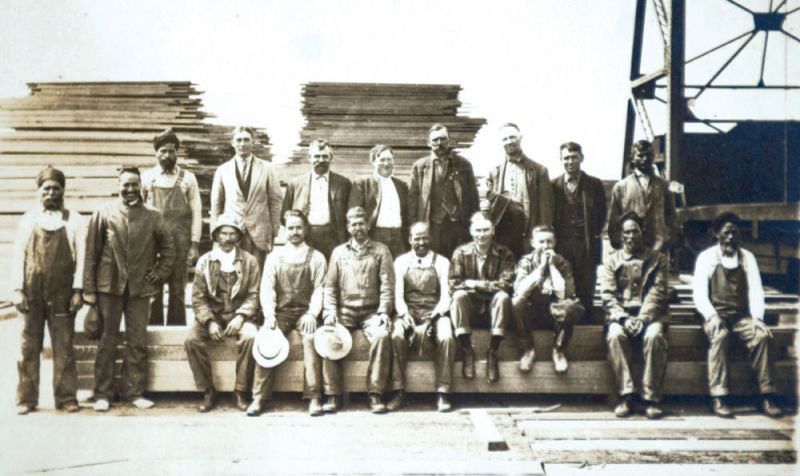
“Indians, many of whom were Sikh, worked at the Hammond Mill before its demise in 1922. During that time period, the Indians left their mark on Astoria, participating in wrestling matches, occupying Alderbrook also known as “Hindu Alley,” and forming the Ghadar political party. Courtesy of Clatsop County Historical Society.” (source: The Daily Astorian)
One of the legacies of the earliest Sikh and Indian immigrants to the United States at the turn of the twentieth century was the creation of the Ghadar Party, a political movement based in northern California that sought to promote India’s liberation from British rule.
Led by Indian expatriates in the United States, the Ghadar Party was formed in 1913. One of its main activities was the publishing of literature to promote resistance to British rule and for a free India. Obviously a threat to the ruling class, the literature was banned in India, and upon their capture, the Ghadarites were often imprisoned or executed as terrorists by the British.
This year, the San Francisco headquarters of the Ghadar Party has been opened to the public by the Indian Consulate as a museum. The printing press that the Ghadar Party used to print their literature is also now on display at the Gurdwara in Stockton, California. However, while it was previously believed that the Ghadar Party was founded in California, historians now place the genesis of the movement further north in the state of Oregon, where Johanna Ogden recently mapped a forgotten (and primarily) Sikh settlement of laborers in 1910 known as “Hindu Alley”.
Guest blogged: Mewa Singh
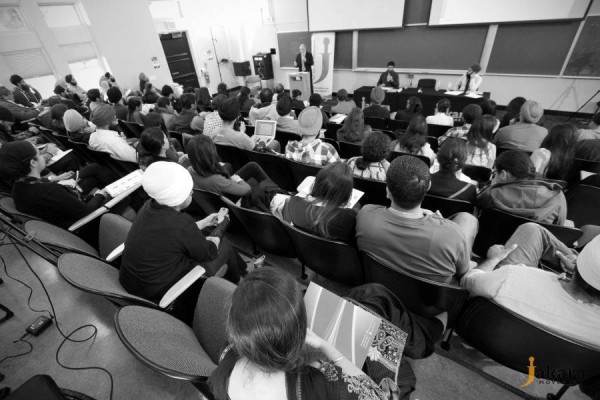 From February 16-17, 2013, researchers from throughout the world, focusing on Sikh-related topics, came together at Stanford University for the 4th annual Sikholars Conference, hosted by the Jakara Movement. From Europe to Pakistan, from India to Canada, and throughout the United States, young scholars came together for a weekend of discussion and engagement in a unique forum that connects the academy to the community. Here, I provide here a bit of a recap and encouragement for those that missed this year to make sure you don’t miss Sikholars 2014.
From February 16-17, 2013, researchers from throughout the world, focusing on Sikh-related topics, came together at Stanford University for the 4th annual Sikholars Conference, hosted by the Jakara Movement. From Europe to Pakistan, from India to Canada, and throughout the United States, young scholars came together for a weekend of discussion and engagement in a unique forum that connects the academy to the community. Here, I provide here a bit of a recap and encouragement for those that missed this year to make sure you don’t miss Sikholars 2014.
The conference commenced with an opening address by Professor Thomas Blom Hansen. The director of Stanford University’s Center for South Asia welcomed the audience and shared his excitement for a new partnership between the Jakara Movement and the Center for South Asia in years to come in hosting the Sikholars Conference.  Next followed a lecture by Professor Linda Hess, one of the world’s foremost authorities on Bhagat Kabir Ji.
Guestblogged by Mewa Singh
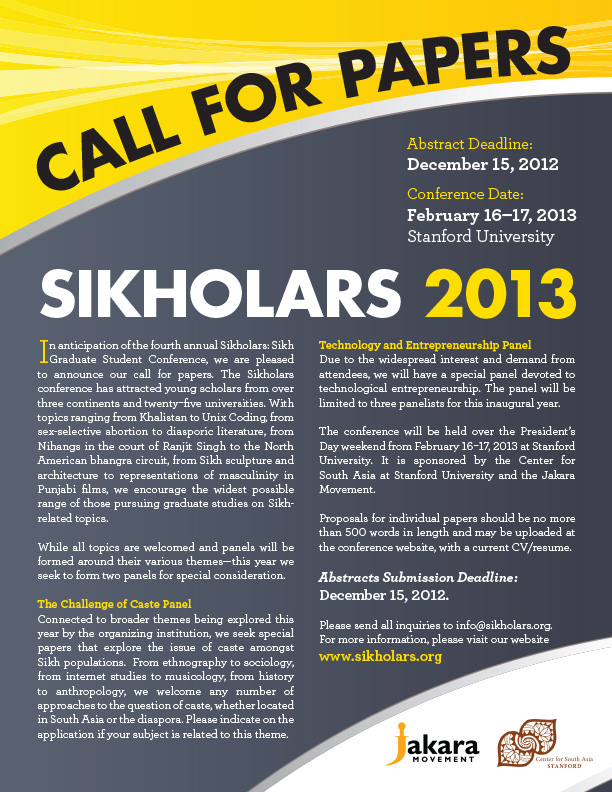 Few events are as anticipated as the annual Sikholars conference, held annually in the Bay Area. Now returning for the fourth year, the event continues to grow, generate new interest, and excite Sikh sangats from the Bay Area and beyond. A showcase for young Sikh scholars and others working on Sikh-related topics, the venue provides an intellectual space for engagement, discussion, and debate.
Few events are as anticipated as the annual Sikholars conference, held annually in the Bay Area. Now returning for the fourth year, the event continues to grow, generate new interest, and excite Sikh sangats from the Bay Area and beyond. A showcase for young Sikh scholars and others working on Sikh-related topics, the venue provides an intellectual space for engagement, discussion, and debate.
The conference has already announced its “call for papers”:
In anticipation of the fourth annual Sikholars: Sikh Graduate Student Conference, we are pleased to announce our call for papers. The Sikholars conference has attracted young scholars from over three continents and twenty–five universities. With topics ranging from Khalistan to Unix Coding, from sex-selective abortion to diasporic literature, from Nihangs in the court of Ranjit Singh to the North American bhangra circuit, from Sikh sculpture and architecture to representations of masculinity in Punjabi films, we encourage the widest possible range of those pursuing graduate studies on Sikh-related topics.
The deadline to apply to present is December 15, 2012.
The event is being hosted by Stanford University’s Center for South Asia and the Jakara Movement.
Co-blogged by Sundari and AmericanTurban
Last week, in the context of the significance of California’s 9th Congressional District to Sikh Americans, we sent the major candidates of California’s 9th Congressional District — incumbent Representative Jerry McNerney and challenger Ricky Gill — a questionnaire to learn more about their positions about Sikh American-related issues (see previous post here). Both candidates responded. However, the nature of the responses received were quite different.
Rep. Jerry McNerney’s campaign responded to the questionnaire and Ricky Gill’s campaign declined to answer. As we had stated in our earlier post, both responses will be printed verbatim and are below.
This past weekend, I attended the second annual Sikh Feminist Conference at the University of British Columbia in Vancouver. A friend posted a concise review of the conference here which I would encourage you to read. I’ll just reiterate two points made – the first being the discussion around whether the western concept of Feminism fits within Sikhi. What does it mean to call oneself a Sikh Feminist or even a Male Sikh Feminist? Many participants at the conference felt the words “Sikh” and “Feminist” were redundant and that it was not necessary for us to try to mold to western definitions of feminism when our own faith clearly defines the concept of [gender] equality. On the other hand, others argued that the word is powerful enough to raise and question the issue of patriarchy that continues to exist within the community. The discussion reminded me of a similar conversation that was had at the Faith and Feminism panel, featuring Sikh women, which took place last year in NYC. About the panel discussion, the author writes,
The core values in Sikhism, particularly the human rights element, were what informed [the panelist’s] views on issues, including women’s rights. She has taken the word “feminism” out of the equation, and transplanted the values of it back into Sikhi, and reminded us that anyone who adheres to the principles of Sikhism and to the words of the Guru Granth Sahib has many labels, feminist, humanist, and activist are just some of them.
The second point is the important link between theory and practice within the Sikh community. I want to highlight this in two ways. The first being that while it has been established that the Gurus emphasized living in an eco-friendly way, it’s clear that as a community we are still working to close the gap – from melas to gurdwaras to within our own homes – our practice of living in an eco-friendly way could use some improvement. EcoSikh sponsored the Sikh Feminist conference and it’s presence was felt very thoughtfully throughout the day (biodegradable utensils, compost, recycling etc!) and it was inspiring to see our community not just talk about it in theory, but actually put it into practice.
Another discussion was around the concept of izzat or honor, whether it impacts both men and women, how it manifests differently for men and women and why it continues to be a topic of discussion when theoretically, our Gurus gave us the guidance and tools to live in an egalitarian society. The concept itself has been one of discussion on our blog too – particularly around what it means to a family and to a community. We are once again reminded of this issue with the recent news of Baljinder Kaur, a pregnant woman from Yuba City who was arrested over the weekend, just before the Sikh Women’s conference, for apparently killing her mother-in-law.
Co-blogged by Sundari and AmericanTurban
 Of recent and recurring discussion on The Langar Hall and American Turban has been the election race in California’s 9th Congressional District. For Sikh Americans, this district’s race is significant.Located in northern California, the 9th Congressional District contains America’s oldest and one of its largest Sikh American communities. The oldest Gurdwara in the United States (which only a couple of weeks ago celebrated its centennial anniversary) is located in this District in Stockton, California. America’s first Asian American and Sikh American member of Congress, Dalip Singh Saund, once resided in this area, and one of the candidates currently running is himself a Sikh American.Given the unique character of the District, we are interested to know the thoughts of the main candidates of the district on the issues affecting their current and potential Sikh American constituents, many of whom have been active in supporting each of the candidates. It is our plan to publish these answers by each candidate to learn more about their positions on issues affecting Sikh Americans.With election day in the US nearing, we have asked the main candidates — incumbent Representative Jerry McNerney and Republican challenger Ricky Gill — to offer their thoughts on Sikh American issues. We are aware that important concerns of the general public on issues like jobs, healthcare, or social issues are often already asked of the candidates, but that their positions on Sikh American issues are not asked of them. Accordingly, these questions reflect Sikh American concerns that do not get the same attention from mainstream media.
Of recent and recurring discussion on The Langar Hall and American Turban has been the election race in California’s 9th Congressional District. For Sikh Americans, this district’s race is significant.Located in northern California, the 9th Congressional District contains America’s oldest and one of its largest Sikh American communities. The oldest Gurdwara in the United States (which only a couple of weeks ago celebrated its centennial anniversary) is located in this District in Stockton, California. America’s first Asian American and Sikh American member of Congress, Dalip Singh Saund, once resided in this area, and one of the candidates currently running is himself a Sikh American.Given the unique character of the District, we are interested to know the thoughts of the main candidates of the district on the issues affecting their current and potential Sikh American constituents, many of whom have been active in supporting each of the candidates. It is our plan to publish these answers by each candidate to learn more about their positions on issues affecting Sikh Americans.With election day in the US nearing, we have asked the main candidates — incumbent Representative Jerry McNerney and Republican challenger Ricky Gill — to offer their thoughts on Sikh American issues. We are aware that important concerns of the general public on issues like jobs, healthcare, or social issues are often already asked of the candidates, but that their positions on Sikh American issues are not asked of them. Accordingly, these questions reflect Sikh American concerns that do not get the same attention from mainstream media.The questions that we have sent to the campaigns of Jerry McNerney and Ricky Gill are below the fold, and on Tuesday, October 30, we will publish the responses from each campaign.
This election year is a reminder that Sikh Americans need to participate more actively in civic and political life. In order for the government and the media to pay attention to issues affecting our community, we need to have a seat at the table where decisions are being made and ensure that our voice is included in any policy changes.
The following are two ways that individuals can take action to change law that would impact the lives of Sikh Americans in California. These actions are for individuals living in California, but similar actions can and will take place in other states at various times. California is the 8th largest economy in the world, so if these changes become law – then these actions are even more meaningful for the Sikh community. It will go down in history that Sikh Americans helped create change for not just our own community but other marginalized communities too.
The following two bills have already successfully passed through both the California Assembly and Senate. Much of the hard work has been accomplished thanks to advocates within the Sikh community, sangat members across the state and Sikh organizations such as The Sikh Coalition. The final step in this process is for Governor Brown to sign these bills into law. You can help by taking one small step for each bill – by simply contacting the Governor’s office. While Governor Brown has until September 30th to sign these bills into law, he can decide on the bills any day. We encourage you to take action today! Please leave a comment in the section below letting us know if you have taken action.
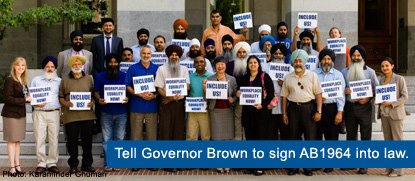 AB1964 – Workplace Religious Freedom Act: SIGN THE PETITION
AB1964 – Workplace Religious Freedom Act: SIGN THE PETITION
If this bill moves forward and becomes law, it will sharply reduce job discrimination against Sikhs and other religious minorities and guarantee equal employment opportunity to all workers in California.

SB1540 – Revised Curriculum Framework: History-Social Science: SIGN THE PETITION
This bill would authorize the State Board of Education to complete the revision process of the History-Social Science Framework for California schools. When completed, this framework will ensure that California students learn about Sikhism and Sikh contributions, thereby increasing appreciation for diversity and reducing ignorance of the sort that leads to bullying and bias.

Ricky Gill is the son of Sikh parents and is running to represent California’s 9th Congressional District (photo: Ricky Gill campaign website)
I have written several times in the past about Ranjit “Ricky” Gill, the Republican Party candidate for Congress in California’s 9th Congressional District. Gill is challenging Democratic Party incumbent Jerry McNerney for the seat.
Gill, 25, is the son of Sikh physicians in the Stockton, California area. Much of the donations to his campaign have come from the Sikh community, as well as interests in the healthcare and agricultural industries. The northern California constituency for which Gill is contesting is an area that has a sizable Sikh population and is, in fact, home to the first and oldest Gurdwara in the United States (the Gurdwara is celebrating its 100-year anniversary this year).
There have been a variety of questions about Gill’s candidacy, particularly based on his age and lack of experience, and claims that he is downplaying his party affiliation (indeed, the fact that he is running as a Republican is not immediately transparent on his campaign website).
In April, I wrote about the emerging perception that Ricky Gill was also distancing himself from his Sikh background:
Much like South Carolina Governor Nikki Haley did when she ran for the Governor’s seat, Gill is reportedly distancing himself from his Sikh heritage in his campaign and emphasizing a Christian background. As Haley endorsed Gill late last year, perhaps it should not be a surprise that he is following her playbook, but it is nonetheless disappointing that a Sikh American is choosing to obscure his own background for the sake of an election.
Shortly afterwards, I contacted Gill’s campaign to offer the opportunity to address this issue. I did not receive a response.
Fast forward to today, Gill’s minimal response to the attack at the Oak Creek, Wisconsin Gurdwara has reinforced the belief that Gill is dissociating himself from his religious background.
Co-blogged by JooKay Singh and Jodha
Our fellow langa(w)r-iter – Navdeep Singh highlighted the dominant pop genre of Punjabi music that celebrates nihilism and suicide through political complicity and destitution. Today, we highlight another form of music that has reached new heights in the shadow of the Shaheed.
UK-based producer Tru-Skool’s latest dharmic-track, ‘Beant Satwant Da Badla‘, which will be part of the 10th Shaheedi Immortality album, has topped the BBC Official Asian Download Chart this weekend gone. This isn’t the first time one of the Shaheedi Immorality tracks has been on the BBC Asian Network playlist (Tigerstyle’s Son of a Sardar and Jhooldey Kesri Chande have previously been played by Bobby Friction, Nihal & Adil Ray amongst others), and some would argue this track isn’t pushing the envelope musically or lyrically, since the Immortal Production (IP) collective have been putting out similar tracks for the past 10 years. So, what’s different, and is this a flash-in-the-pan riding on the back of kesri lehar, or is there more?

Previous IP tracks were given play time on the BBC courtesy of their association with Tigerstyle, who are well respected in the UK as innovative producers, rather than for the tracks themselves; diligent listeners will have noted that the songs were also edited to remove ‘controversial’ lyrics. In Jhooldey Kesri Chandey, for example, the first thirty seconds or so contained part of a speech by Baba Jarnail Singh Bhindrawale, and was removed entirely. Beant Satwant Da Badla, by contrast, has received air time by virtue of being the most officially download ‘asian’ track last week in the UK and was played unedited.
I came across this poem today, and definitely wanted to share with all you Langarites. Preeti Kaur, the author from California, is able to speak to numerous aspects of self-identifying as a Punjabi. We’ve had some discussions around Punjabi and Sikh identity here before, thought it would be refreshing to have an artistic take to the topic. Here are a few of my favorite lines:
You Bring Out The Punjabi In Me
By: Preeti Kaur
with respect to Sandra Cisneros’ “You Bring Out the Mexican In Me“
…
sonu
you burn the inquilabi in me
ghadar is a language
i speak only to you
pacific mist we breathe
the subcontinent to freedom
from our san francisco dreams
hidden under guise of fog
tag taxis with saffron orange bumper stickers
ZINDABAAD!!! ZINDABAAD!!!
perhaps the morning pooni the start of our rebellion
radioactive jalebis the danger
we eat
Click here for the audio podcast and full poem published at the online literary magazine Qarrtsiluni.
This past weekend, CSU East Bay’s Ethnic Studies Department and Sikh Studies Chair along with the Jakara Movement held its third annual Sikholars Conference. Along with the 11 graduate students from all over North America, nearly 100 community members came together to share and engage in their research projects.
Opening on Saturday, Dr. Jaideep Singh welcomed the participants and discussed the burgeoning field of “Sikh Diasporic” studies that is finally beginning to bear fruit. The first panel showcased the projects of Bandana Kaur, a Yale graduate, on issues of ecofeminism, biodiversity, and social effects of the Green Revolution and Guneeta Kaur Bhalla on the challenges, development, and prospects of the 1947 Partition Archive. Both projects bring together social histories and the voices of non-elite subalterns to the fore.
The second panel, titled the “Identities of Law”, explored Sikh-Americans in a legal context. Jasmine Singh discussed the “racialization” of Sikhs in the United States, while Kiran Preet Dhillon reflected on the ways that Title VII, instead of promoting accommodation to religion in the workplace, have served to limit and demean. She called for a rigorous opening of the conversation with groups that fight for freedom from discrimination in the workplace, including SALDEF and the Sikh Coalition. The panel discussant was conference host, Dr. Jaideep Singh.
The last panel of the day involved explorations in musicology. Neelamjit Dhillon, a student at California Institute of the Arts, showcased his music talents and the convergence of technology and music, adding visual imagery to the auditory experience. Harpreet Neelam, from the University of Toronto, mesmorized the audience with her vocal talents and her explanations of the partaal through the shabad “Mohan Neend na Aavaey Haaveh.” View her amazing rendition (along with Neelamjit Singh on the thabla; pagh salute: RimmyKay) below and continue reading beneath the fold.

The first day concluded with a viewing of Harjant Gill (Sikholars, Class of 2010)’s documentary – “Roots of Love.”
You may recall the murders of Elk Grove, California residents Surinder Singh and Gurmej Atwal, two senior citizens and turban-wearing Sikhs who, while on their daily walk, were shot down in a drive-by last year. Despite last October’s Day of Action by the community to spread awareness of the murder and to help get some new leads, to date the killer(s) have not been identified and no motive has been established. However, the murders of these Sikh grandfathers are suspected to be a hate crime.
The Elk Grove, California Police Department provided an update yesterday in their search for the killer(s) of Sikh seniors Surinder Singh and Gurmej Atwal, who were shot and killed last year while on their daily walk. Based on witness accounts, the police have now have a confirmed description of the suspect’s vehicle:
At a press conference this afternoon, police officials said the suspect drove a lifted full-size pick-up truck, tan or gold in color, with a standard-size cab, similar to the one pictured at left. They do not have details on the make or model year of the truck.
Initially, police had been searching for a pick up truck, but have now been able to provide a little more detail about the vehicle. The investigation is still ongoing and the police are seeking more information, with a reward offered of $57,000. The Elk Grove Police Department can be reached at (916) 714-5115. If you live in northern California, spread the word about the suspect’s vehicle. Someone out there knows something that will help solve this crime.
 First off, my sincere apologies to all in delaying the posting of this entry for far too long. Over winter break, nearly 20 students participated in the Jakara j.Korps initiative that seeks to explore the issue of immigration. Here is a photo-essay composed by Josh Singh.
First off, my sincere apologies to all in delaying the posting of this entry for far too long. Over winter break, nearly 20 students participated in the Jakara j.Korps initiative that seeks to explore the issue of immigration. Here is a photo-essay composed by Josh Singh.
During winter break 2011 members of the Jakara Movement were brought together for the first annual SUJH Alternative Winter Break to examine the issue of immigration first-hand by visiting the so-called ground zero, the Mexi-Cali border. The issue of illegal immigration continues to be brought to the forefront as witnessed in the divisiveness this issue caused among 2012 Republican primary candidates and the recent rise of nativist sentiment that has been fueled by deteriorating economic conditions. In 2006, huge protests calling for a more open and humane immigration policy were lead mostly by our Chicano/a and Latino/a brothers and sisters. The Sikh-American response to this issue however has been largely indifferent and silent. Through this trip, our goal was to break down commonly held conceptions about undocumented migrants and their journey into the U.S. (sujh=becoming aware). One of the most common misperceptions among people is that illegal immigration is a Latino-centric issue and therefore primarily deserves attention from that community. However, as seen in the LA times article earlier this year highlighting the increasing number of undocumented Punjabi workers in the U.S. (1600 were caught and detained in 2010 alone), this is hardly the case. It is imperative for us to stand in solidarity with other communities, especially on issues we have a personal stake in. Otherwise, how can we expect them to support issues that are deeply important to us?
 For many of us school is out and the holidays are upon us. Throughout the season, many Sikhs throughout the world engage in seva to support members of the community in which they live. We expect this year to be no different.
For many of us school is out and the holidays are upon us. Throughout the season, many Sikhs throughout the world engage in seva to support members of the community in which they live. We expect this year to be no different.
We hope that commenters will use this section to highlight events or drives that may be occurring in their local communities. Here is one such effort by the youth of the Fresno Jakara Movement group.
Part of something larger and hoping to set an example for other communities, the Sikh youth of Fresno are coming together to organize their annual Sikhi, Seva, Cinema event. More information can be found on their facebook page. They are hosting fundraisers for items that will be distributed to those that are currently houseless in the city. The event is completely youth driven and they are calling for other Sikhs to be generous with their time on December 17 or generous with their money to assist others. The national press has highlighted the preponderance of poor in rural central California. We hope other Sikhs become active in their communities, just as these youth are doing.
It’s that time of year again!
For those Southern California natives, you (hopefully) know it rolls around once every year. This year, SikhLens is proud to announce its annual Sikh Arts and Film Festival to be held November 18th – 20th, 2011 at the prestigious Dodge College of Film and Media Arts at Chapman University in Orange, California. As avid supporters of Sikh Arts, and creativity in general, I am hoping our readers would be especially interested in this event coming up in the next couple of weeks.

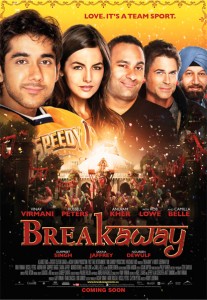 The Sikh Arts and Film Festival serves as a central venue for artists to showcase and share Sikh heritage and culturethrough the mediums of film, literature, art, music, social media and fashion. As an often-misidentified minority, this type of forum has proven to be essential for Sikhs to transcend cultural boundaries, generate awareness, and connect with the broader community.
The Sikh Arts and Film Festival serves as a central venue for artists to showcase and share Sikh heritage and culturethrough the mediums of film, literature, art, music, social media and fashion. As an often-misidentified minority, this type of forum has proven to be essential for Sikhs to transcend cultural boundaries, generate awareness, and connect with the broader community.
For tickets, scheduling and more information, visit www.sikhlens.com.
Co-blogged by Sundari and Ajaib Kaur
How many young Sikh women do you know who are looking to meet their Sardar? And how many young Sikh men do you know who are looking to meet their Sardarni?
know who are looking to meet their Sardarni?
Lots? We hear you. But how can we make these two groups meet?
We decided to write a post on this topic for many different reasons. It’s clear that there is little space elsewhere to talk about how young Sikhs can meet each other, with the potential of pursuing something beyond a friendship.
Gasp! Are we actually admitting this? After a few dialogues with friends and families, we decided that we may as well start breaking the ice here on the West Coast. Over the last few years, SikhNet has been hosting “Gursikh Speed Meetings”, in cities such as New York, Boston, and Toronto. It is nice to see that the organizers has decided to bring this successful event to the West Coast, in our beloved City of Angels. These events give young, single Sikhs between the ages of 25-40 a chance to meet fellow single-and-ready-to-mingle like minded Sikhs in a communal safe space. This concept may feel familiar, because it is. The ‘speed meeting’ is a popular spin-off of an American cultured speed-dating event; having an even number of men and women participants, and rotating through getting a brief chance to connect with everyone in the room. It seems like a lot of work, but based on our feedback from some past participants, it is fairly enjoyable. The best part: if you do not click with someone mutually, you do not need to face them again. Contact information is only shared if both parties have expressed interest in each other. Fool proof for both ladies and gents!
 Guestblogged by Mewa Singh.
Guestblogged by Mewa Singh.
A young and vibrant community in the diaspora, it is incumbent upon us to remember our trailblazers. Hari Singh Everest was one such person. I remember reading his name during my undergraduate days. Stumbling across the ‘Sikh Review’, when I should have been completing other studies, it was the first time I had read a literate Sikh journal in English. Skimming the names of editors and contributors on the back, I noticed one from my very own California – Yuba City to be exact. Hari Singh Everest. I didn’t know him, but the unusual last name stuck in my head.
It would be years later when I finally met him. Some years ago the Jakara Movement decided to sponsor the efforts of all the collegitate Californian Sikh Students Associations (SSAs) in building a unity float. Since then, the float at the Yuba City Nagar Kirtan has become an annual affair.. The Everest Family graciously opened their home and it was on one such opportunity that I got to sit down with Hari Singh and speak to him. I mentioned that I had read his name on that Sikh Review issue years ago and he smiled. He talked about his experiences in the Sikh community and as being a sort of ambassador during those early years. It is a conversation I cherish.
His life in the United States stretches back to the 1950s (before the ‘Great Society’ immigration policy of LBJ) and his life in Yuba City goes back to 1961.
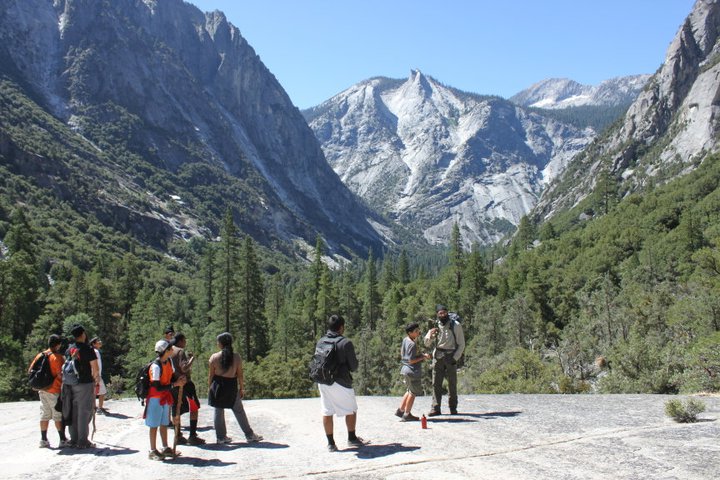 Guestblogged by Mewa Singh.
Guestblogged by Mewa Singh.
Here are some general musings and broader notes/reflections that were sparked by my participation in the camp:
On Parenting – One thing I found quite interesting was changes in parenting styles. I don’t remember having had many choices as a child, when my parents were going to put their foot down, and it seems my own parents confirm this. With the camp, I noticed we had so many parents expressed their desire for their sons to attend, only to begin avoiding our calls as the date approached and telling us our son doesn’t want to go. Many of the same parents often complained – our son doesn’t listen to us and just watches TV all day. I was left wondering, how do these children have the choice? A parent has the ability to parent and limit the child’s television viewing, if they so desire. A parent is not helpless to say our child doesn’t listen so we must accept the status quo. Many parents desire to be the ‘friend’ of their child, or be the ‘good guy/gal’ and never say ‘no.’ With so many of my friends young parents, I wonder how they will be setting boundaries.
On Consumerism – Now members of our community are part of the broader society and one would hardly expect larger sociological issues such as consumerism to not affect us. Still the degrees seem far more now than in my youth. I remember kids having and even getting beat up and their shoes stolen if they had the latest Jordans. With 13-year olds having iPhones, 16-year olds getting BMWs for their birthdays (Jodha had a reflection on this some time ago), and wardrobe prices that went far beyond our $15 jeans from Marshalls, I wonder what are we teaching our children? Ask parents to send their children to a Sikh workshop or even Punjabi/Khalsa school at their Gurdwara and parents will begin about fees being far too high. What do we actually value and what do we wish to teach our children to value?
Guest-blogged by Mewa Singh. Mewa Singh is a sevadar with the Jakara Movement.
Reviving and reinterpreting our historic terminology were part of the naming process of this unique camp.
With the Guru’s Grace, from August 1-10, I had the opportunity to be a sevadar for the Jakara Movement’s first annual Bhujangi Youth Academy. Unlike anything else in our community before, the academy specifically served the needs of at-risk young Punjabi Sikh males.

